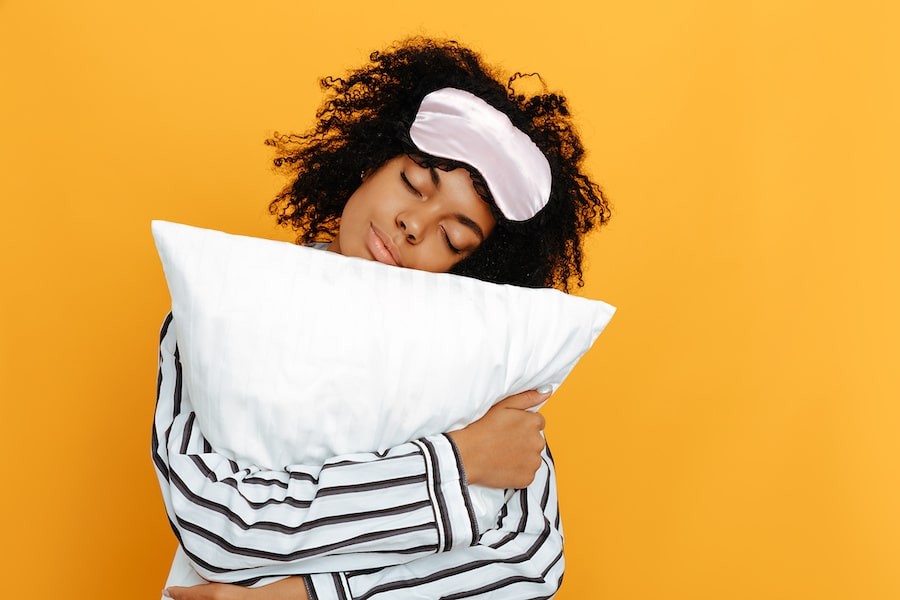The link between diabetes and sleep disorders

The link between diabetes and sleep disorders
What could be better than a good night's sleep to recharge your batteries and start the day feeling fresh and rested? We spend about a third of our lives asleep [1], but sometimes our sleep is not as restful as we would like it to be. Short nights, frequent wake-ups, difficulty falling asleep, insomnia: is there a link between diabetes and sleep disorders? And what solutions are available to help you sleep better?
How are diabetes and sleep disorders linked?
A good night's sleep is essential for the well-being of your body and mind [2,3]. According to clinical research, one-third of people with diabetes are affected by sleep disorders [2]. Many studies have been carried out to understand the link between diabetes and sleep problems, and the relationship between diabetes and sleep disorders has been shown to be bi-directional [4].
On the one hand, an insufficient amount of sleep (6.5 hours or less), frequent waking up and abnormal night-time breathing may complicate diabetes management. How can this be explained? It would appear that during sleep, a whole host of regenerative physiological processes take place, but they can be disrupted by nights that are too short or fragmented. This is thought to lead to hormonal imbalance, impaired glucose metabolism, and insulin resistance, which can, in turn, lead to fluctuating blood glucose levels [1,2,4,5,6].
On the other hand, having diabetes may affect the quality and duration of sleep, especially when it is unbalanced [4,5,7]. In the case of hyperglycaemia, a frequent urge to urinate and intense thirst can lead to waking up several times a night.[5] The symptoms of hypoglycaemia, such as tachycardia and excessive sweating, can also lead to waking up and/or poor quality sleep [2,5,7]. Unbalanced diabetes, especially when associated with being overweight, is also thought to be conducive to sleep apnoea. This is a night-time breathing disorder that causes insufficient blood oxygenation and often results in reduced quality sleep and shorter nights [1,2,4].
Other factors, sometimes associated with diabetes, can also promote sleep disorders:
- Fear of hypoglycaemia [6];
- Overweight and obesity [2,4];
- Restless legs syndrome - the urge to move your legs accompanied by an unpleasant feeling of itching, trembling, or pain [2];
- Diabetic neuropathy [2,5];
- Insufficient production of the sleep hormone melatonin [7];
- Depression [5].
A few tips to help you sleep better
Rest assured: having diabetes does not necessarily mean that you have to sleep poorly. There are many solutions aimed at helping you fall asleep faster and get your sleep patterns back on track. Here a few recommendations:
- Try to keep your body weight under control by following a well balanced diet and by doing regular physical activity [1,2,4];
- Consider limiting smoking, caffeinated and sugar-rich foods and drinks [2,8];
- Try as much as possible to go to bed and get up at the same time every day so as not to disturb your biological clock [6] ;
- Do some kind of aerobic physical activity during the day, such as cycling, running, swimming, and dancing [2,10];
- Take a hot bath before going to bed [9];
- Include sleep-enhancing foods such as barley grass powder, lettuce, cherries, kiwi fruit, or nuts in your dinners [8];
- Do some meditation and/or yoga [3,11].
As sleep disturbances can affect blood glucose levels, sleeping better and longer will not only improve your general well-being but also help manage your diabetes [4,6]!
Sources:
- Reutrakul S, Van Cauter E. Interactions between sleep, circadian function, and glucose metabolism: implications for risk and severity of diabetes. 2014 Apr;1311:151-73. doi: 10.1111/nyas.12355. Epub 2014 Mar 14.
- Surani S, Brito V, Surani A, Ghamande S. Effect of diabetes mellitus on sleep quality. 2015 Jun 25;6(6):868-73. doi: 10.4239/wjd.v6.i6.868.
- Heather L Rusch, Michael Rosario, Lisa M Levison, Anlys Olivera, Whitney S Livingston, Tianxia Wu, Jessica M Gill. The effect of mindfulness meditation on sleep quality: a systematic review and meta-analysis of randomized controlled trials. Ann N Y Acad Sci. 2019 Jun;1445(1):5-16. doi: 10.1111/nyas.13996. Epub 2018 Dec 21.
- Barone MT, Menna-Barreto L. Diabetes and sleep: a complex cause-and-effect relationship. Diabetes Res Clin Pract. 2011 Feb;91(2):129-37. doi: 10.1016/j.diabres.2010.07.011.
- Sarah S. Farabi. Type 1 Diabetes and Sleep. Diabetes Spectrum. 2016 Feb; 29(1): 10-13. doi: 10.2337/diaspect.29.1.10.
- Katia M Perez, Emily R Hamburger, Morgan Lyttle, Rodayne Williams, Erin Bergner, Sachini Kahanda, Erin Cobry, Sarah S Jaser. Sleep in Type 1 Diabetes: Implications for Glycemic Control and Diabetes Management. Curr Diab Rep. 2018 Feb 5;18(2):5. doi: 10.1007/s11892-018-0974-8.
- Garfinkel D, Zorin M, Wainstein J, Matas Z, Laudon M, Zisapel N. Efficacy and safety of prolonged release melatonin in insomnia patients with diabetes: a randomized, double-blind, crossover study. Diabetes Metab Syndr Obes. 2011;4:307-13. doi: 10.2147/DMSO.S23904. Epub 2011 Aug 2.
- Yawen Zeng, Jiazhen Yang, Juan Du, Xiaoying Pu, Xiaomen Yang, Shuming Yang, Tao Yang. Strategies of Functional Foods Promote Sleep in Human Being. Curr Signal Transduct Ther. 2014 Dec;9(3):148-155. doi: 10.2174/1574362410666150205165504.
- Edward C Harding, Nicholas P Franks, William Wisden. The Temperature Dependence of Sleep. Front Neurosci. 2019 Apr 24;13:336. doi: 10.3389/fnins.2019.00336. eCollection 2019.
- Masahiro Banno, Yudai Harada, Masashi Taniguchi, Ryo Tobita, Hiraku Tsujimoto, Yasushi Tsujimoto, Yuki Kataoka, Akiko Noda. Exercise can improve sleep quality: a systematic review and meta-analysis. PeerJ. 2018 Jul 11;6:e5172. doi: 10.7717/peerj.5172. eCollection 2018.
- Marieke Van Puymbroeck, Karen Atler, Jennifer Dickman Portz, Arlene A Schmid. Multidimensional Improvements in Health Following Hatha Yoga for Individuals with Diabetic Peripheral Neuropathy. Int J Yoga Therap. 2018 Nov;28(1):71-78. Doi: 10.17761/2018-00027. Epub 2018 Feb 8.

